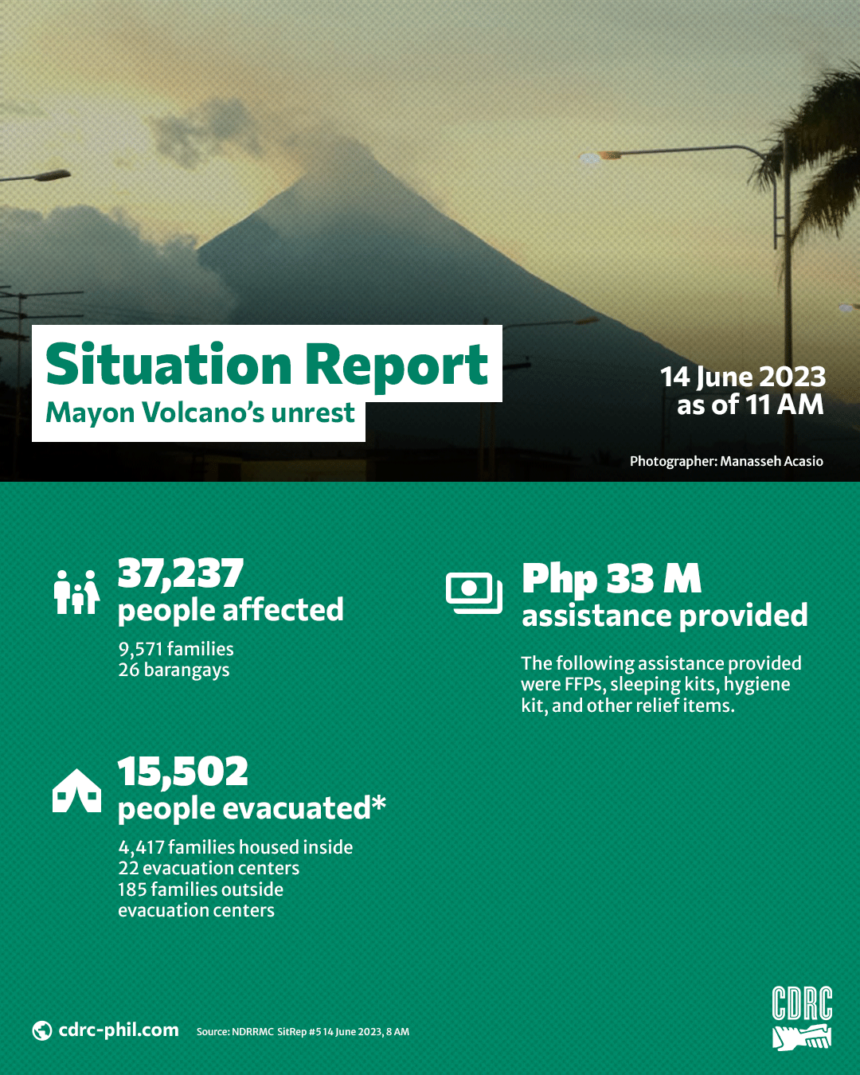Mayon Volcano’s unrest
Situation Report #1
June 14, 2023
11:00 am
Situation Overview
Mayon Volcano located in the province of Albay has been exhibiting increased volcanic activity since June 5. The volcano is currently under close monitoring by The Philippine Institute of Volcanology and Seismology (Phivolcs) due to the potential for further eruptions. Following a substantial increase in the frequency of rockfall from its summit lava dome from an average of 5 events/day in May 2023 to 49 events/day on June 5, 2023, the alert status of Mayon Volcano was increased to Alert Level 2 (Increasing Unrest).
Based on seismic recordings, days of increased rockfall incidence and volume were followed by the creation of brief PDCs or “usons” on June 8, 2023. Around 12:00 noon, Alert Level 3 (Increased Tendency Towards Hazardous Eruption) was raised.
As of June 13, 2023, Mayon Volcano is still at Alert Level 3 which indicates that it is now experiencing a high level of unrest due to the presence of magma at the crater and the potential for a dangerous eruption within a few days or perhaps a few weeks as per the Phivolcs report.
Since the spike in volcanic activity last week, more than 14,000 people have been forced to leave their towns which are within a 6km (3.7 miles) radius of Mount Mayon’s crater. However, a certain number of individuals continue to live in the area below Mayon which has been classified as a permanent danger zone. Despite the area’s longstanding ban on habitation, generations have lived and worked there because they had nowhere else to go. As volcanic activity rises the threat remains elevated for residents of Albay.
Source: Albay Provincial Disaster Risk Reduction and Management Office, Philippine Institute of Volcanology and Seismology (PHIVOLCS), NDRRMC
Affected Populations
According to the National Disaster Risk Reduction and Management Council, as of June 14, the irregular activities of Mayon have caused the displacement of 15,502 people, or 4,417 families, from the communities of Camalig, Ligao, Daraga, Guinobatan, Malilipot, and Tabaco.
Some homeowners still find a way to check on and manage their livestock in spite of the risk warnings; some chose to stay despite their dangerous circumstances. Displaced people are still in need of immediate assistance such as food and health kits.
35 local residents were reported to have had respiratory problems by the Department of Health (DOH) after they were forced to flee their homes because of the unrest at Mayon Volcano. However, not all of these incidents are linked to the harmful consequences of sulfur dioxide and volcanic ash.
Source: National Disaster Risk Reduction Management and Council (NDRRMC) DSWD Dromic
Emergency Response Efforts
1. CDRC along with its regional center on the ground continues to monitor the situation and has begun issuing situation reports.
2. Our regional partner TABI convened an emergency meeting with its volunteers on June 09.. TABI also began coordinating with the LGU – Albay Public Safety and Emergency Management Office (APSEMO) to assess the situation. However, assessing the demands, needs, and capacity of the affected communities is still in progress as the evacuation of residents from the 6 km pdz and beyond the 7 km pdz is ongoing.
3. Additionally, 256 families and 1,280 individuals who are staying at the evacuation shelter in Guinobatan Community College, particularly in the Barangays of Tandarora and Maninila were provided hot meals initiative by our regional partner TABI.
4. CDRC has opened a “Call for Donation” for the families affected by the volcanic eruption in Albay.
Resources Available
1. Standby emergency funds
2. Prepositioned goods at the CDRC warehouse
3. Monetary and in-kind donations
Expressed Needs
1. Immediate needs of the affected individuals include food, drinking water, facemasks (KN95), and hygiene kits.
Coordination
Regional Center
1. Tarabang sa Bicol (TABI)
Contacts
Dom Ybera , Deputy Executive Director, dybera.cdrc@gmail.com
Cora Jazmines, Local Partnerships Department, 0928-182-4969, lpd@cdrc-phil.com

